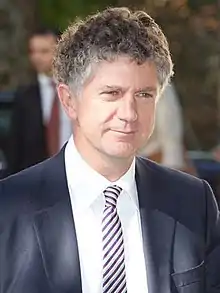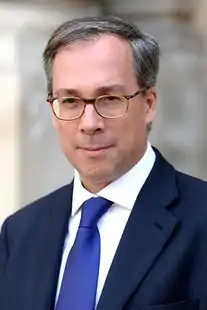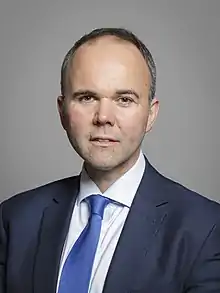Downing Street Chief of Staff
The Downing Street Chief of Staff is the most senior political appointee in the Office of the Prime Minister of the United Kingdom, acting as a senior aide to the Prime Minister, a powerful, non-ministerial position within Her Majesty's Government.
Downing Street Chief of Staff | |
|---|---|
.svg.png.webp) Coat of Arms of the United Kingdom | |
| Prime Minister's Office | |
| Appointer | Prime Minister |
| Formation | 2 May 1997 |
| First holder | Jonathan Powell |
| Website | 10 Downing Street |
The role of chief of staff initially had executive authority, and at the time of its creation, was referred to as "almost certainly the most powerful unelected official in the country", and possibly "the third most powerful altogether" after the prime minister and the Chancellor of the Exchequer.[1] Since 2007 the role does not legally have executive authority, although the post holder remains by definition the senior adviser to the prime minister.
From 1997 to 2019 and since 2020, the title of chief of staff has been held by the most senior special adviser at Downing Street. The office has been held since 1 January 2021 by former principal private secretary to Alistair Darling and George Osborne, Dan Rosenfield.
History
The position of Downing Street Chief of Staff was created by Tony Blair upon becoming prime minister in 1997. The first chief of staff was Jonathan Powell, who held the post for ten years.
The chief of staff is an appointed special advisor or a career civil servant who is personally and politically close to the prime minister. The responsibilities of the post have varied according to the wishes of the sitting prime minister. Since the chief of staff is at the centre of the Downing Street operation, he or she will always be influential and closely involved in government policy formulation and implementation, political strategy and communication, and generally advising the prime minister.
In 1997 Tony Blair gave his chief of staff, a special advisor, 'unprecedented powers' to issue orders to civil servants.[2] Previously the Cabinet Secretary had been the most senior non-ministerial figure in the British Government, and along with the Principal Private Secretary to the Prime Minister had supported the prime minister in the running of 10 Downing Street. Following the creation of the role, the chief of staff supplanted the Principal Private Secretary in running Downing Street operations and effectively replaced the power of the Cabinet Secretary in terms of co-ordinating government policy.
Although the Cabinet Secretary continued to be a highly important role, through remaining responsible for making sure that the civil service was organised effectively and was capable of delivering the Government's objectives,[3] the chief of staff replaced the Cabinet Secretary as the "right-hand man" for the prime minister.[4] "Powell had been at the epicentre of power. As Tony Blair's Chief of Staff, he was the ultimate fixer, the Prime Minister's first line of defence against events, baby-catcher in chief. When things went wrong, people called Powell."[5]
When Powell stood down as chief of staff at the end of the Blair Premiership in June 2007, the incoming Prime Minister Gordon Brown temporarily appointed civil servant Tom Scholar as both Downing Street Chief of Staff and Principal Private Secretary to the Prime Minister. This was changed upon Scholar's scheduled departure in January 2008, when the title chief of staff was divided amongst two posts in an attempt to split the political policy communication role from the management of civil servants within Number 10.[6] As such, senior civil servant Jeremy Heywood replaced Scholar as principal private secretary to the prime minister, a position he had held under Tony Blair several years earlier, with the role of chief of strategy and principal advisor to the prime minister (effectively chief of staff) being given to political advisor Stephen Carter.[6][7]
After less than a year in the post Carter resigned, becoming a minister and receiving a peerage amid speculation that his part of the chief of staff role had insufficient authority to direct cross-government operations.[8] Heywood continued as both principal private secretary and Downing Street Chief of Staff for the remainder of the Brown Premiership. Upon David Cameron becoming prime minister in May 2010, Heywood returned to the civil service, enabling him to be appointed as the first Downing Street Permanent Secretary. He was replaced as Downing Street Chief of Staff by Conservative advisor Edward Llewellyn. Cameron also created the role of Downing Street Deputy Chief of Staff, with responsibility for supporting the chief of staff, which was given to Catherine Fall.[9]
The formal title was out of use between July 2019 and November 2020, however Dominic Cummings was noted to be the de facto chief of staff.
List of Downing Street Chiefs of Staff
| No. | Chief of Staff | Took office | Left office | Time in office | Party | Prime Minister | |
|---|---|---|---|---|---|---|---|
| 1 | Jonathan Powell (born 1956) | 2 May 1997 | 27 June 2007 | 10 years, 56 days | Labour | Tony Blair (Lab) (1997 – 2007) | |
| 2 | Tom Scholar (born 1968) | 27 June 2007 | 23 January 2008 | 210 days | Independent | Gordon Brown (Lab) (2007 – 2010) | |
| - | Stephen Carter (born 1964) Acting | 23 January 2008 | 10 October 2008 | 261 days | Labour | Gordon Brown (Lab) (2007 – 2010) | |
| 3 | Jeremy Heywood (1961–2018) | 10 October 2008 | 11 May 2010 | 1 year, 213 days | Independent | Gordon Brown (Lab) (2007 – 2010) | |
| 4 | Edward Llewellyn (born 1965) | 11 May 2010 | 13 July 2016 | 6 years, 33 days | Conservative | David Cameron (Con) (2010 – 2016) | |
| 5 | Fiona Hill Nick Timothy | 14 July 2016 | 9 June 2017 | 330 days | Conservative | Theresa May (Con) (2016 – 2019) | |
| 6 | Gavin Barwell (born 1972) | 10 June 2017 | 24 July 2019 | 2 years, 44 days | Conservative | Theresa May (Con) (2016 – 2019) | |
| - | Dominic Cummings (born 1971) Chief Advisor | 24 July 2019 | 13 November 2020 | 1 year, 112 days | Independent | Boris Johnson (Con) (since 2019) | |
| - | Edward Lister (born 1949) Acting | 13 November 2020 | 1 January 2021 | 49 days | Conservative | Boris Johnson (Con) (since 2019) | |
| 7 | Dan Rosenfield (born 1977) | 1 January 2021 | Incumbent | 39 days | Independent | Boris Johnson (Con) (since 2019) |
References
- Ian Katz (2008-03-15). "The inside man". The Guardian. London.
- Nick Assinder. Jonathan Powell BBC 14 July 2004. (Accessed 25 September 2007)
- "Archived copy". Archived from the original on 2010-06-28. Retrieved 2010-06-16.CS1 maint: archived copy as title (link)
- Assinder, Nick (14 July 2004). "Profile: Jonathan Powell". BBC News.
- Katz, Ian (15 March 2008). "The inside man". The Guardian. London.
- Wintour, Patrick (24 January 2008). "Brown's chief of staff leaves for Treasury post".
- "Brown appoints new chief of staff". BBC News. 23 January 2008.
- "Archived copy". Archived from the original on 2010-09-15. Retrieved 2010-06-16.CS1 maint: archived copy as title (link)
- Rogers, Simon (13 June 2010). "Government special advisers: the full list as a spreadsheet". The Guardian. London.



.jpg.webp)



